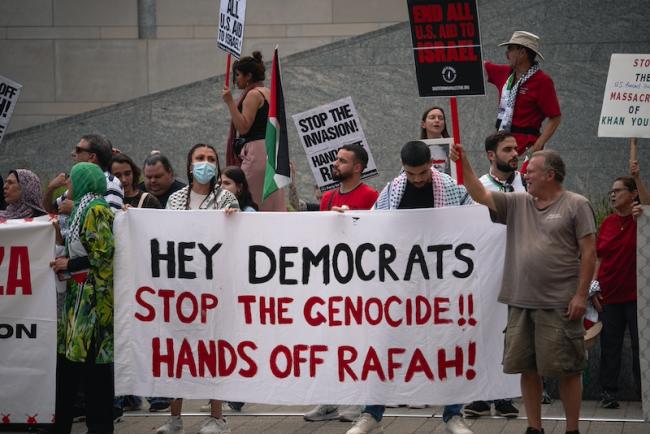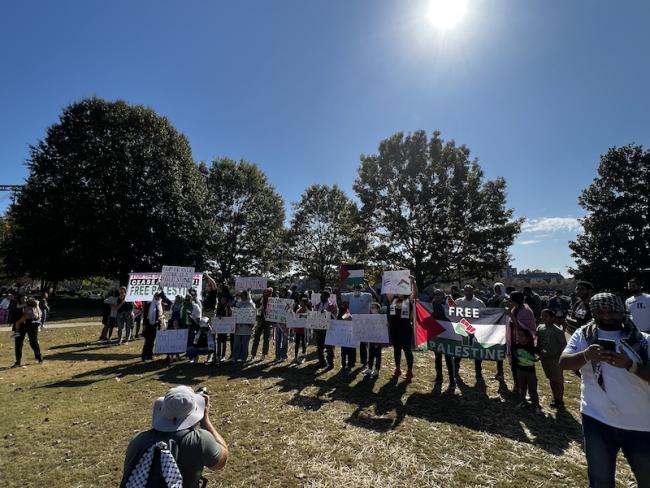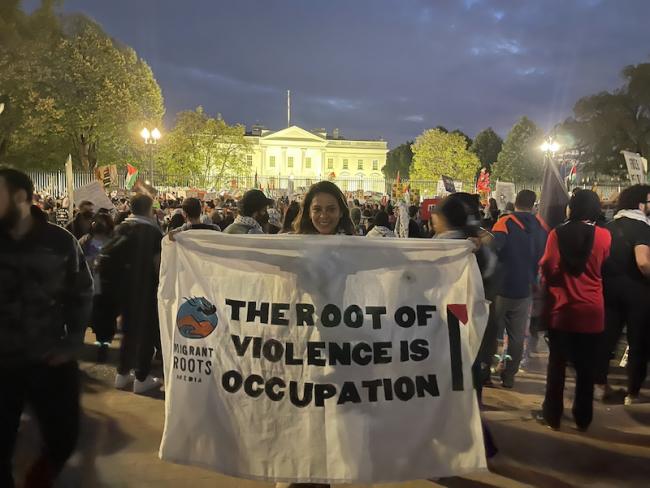
This piece appeared in the Winter 2024 issue of NACLA's quarterly print magazine, the NACLA Report. Subscribe in print today!
In 2018, Durham, North Carolina made history by becoming the first city in the United States to unanimously pass a city council resolution prohibiting the police department from engaging in any “military-style” training program with a foreign country, including Israel. This groundbreaking decision was the culmination of months of organizing by the Demilitarize! Durham2Palestine coalition, a multifaith and multiracial coalition including Muslim, Jewish, Black, and Latine organizations in which I participate as part of Migrant Roots Media.
During more than two hours of impassioned debate on the measure, multiple speakers argued that the perceived singling out of Israel amounted to antisemitism. Some speakers asked why the resolution did not mention countries like Syria and, in the words of one commentator, “savage military countries” across Latin America, including Argentina, Bolivia, and Brazil. Speaking in favor of the resolution, Chilean-born council member at-large Javiera Caballero, the first Latina elected to Durham City Council, responded directly to those arguments. “Let’s just reflect on who actually trained and funded those militaries,” she said. “The first protest I ever went to was a School of the Americas protest in the late 1990s. It was around the training of Latin American soldiers by the U.S. military. This is an issue that is very near and dear for me. I am an immigrant because of military influence and a foreign power.”
Caballero’s statement bringing U.S. and Israeli foreign policy into a local Durham debate was met with applause, as it aligned with Durham2Palestine’s mission to connect the U.S. South—a historic bastion of oppression and resistance in the United States—to struggles across the Global South.
In North Carolina and elsewhere in the U.S. South, solidarity with Palestinian liberation has only become more visible since the escalated Israeli assault and genocide in Gaza that began in October 2023. Organizers, activists, and cultural workers have employed diverse strategies—protests, direct actions, pressure on local elected leaders, targeted BDS campaigns, as well as narrative-shifting artistic and media efforts—to advocate for a permanent ceasefire and an end to the occupation. This roundtable brings together an intergenerational group of six Latin American immigrants, or the children of immigrants, who live and organize in solidarity with Palestinian liberation in the U.S. South.
Roxana Bendezú, 45, is an immigrant from Lima, Peru and the founding director of Migrant Roots Media. Based in Durham, she is an active member of the Demilitarize! Durham2Palestine coalition and the North Carolina Triangle chapter of Pax Christi USA, the national Catholic peace movement founded in 1972. Ramón Mejía, 41, lives in Dallas, Texas and is the son of an immigrant father from Michoacán, Mexico and a Chicana mother from South Texas. He is the anti-militarism national organizer with Grassroots Global Justice Alliance and a member of About Face: Veterans Against the War. Moises (Mo) Rodriguez Cruz, 26, lives in Chattanooga, Tennessee and is the cofounder and field director of Semillas TN. He was born in Mexico City and is a DACA recipient. Alyssah Roth, 32, is the daughter of an immigrant mother from Juárez, Mexico and an immigrant father from Czechoslovakia. They are a member of the North Carolina Jewish Voice for Peace chapter and a leader of JVP’s local Community Care Working Group in Durham. And Alex Trejo, 24, and Victor Urquiza, 23, are organizers with the Party for Socialism and Liberation. Trejo is an immigrant from Monterrey, Nuevo León, Mexico. Urquiza was born in Morelia, Michoacán, Mexico and migrated with his family to Atlanta, Georgia when he was four. They are both DACA recipients and live in Durham.

I interviewed each of these organizers separately, either in person or via Zoom, in August 2024. Here, I present their responses side by side, placing their experiences and perspectives in conversation. Their testimonies collectively shed light on how their personal stories of migration and analyses of Latin American history and politics drive their solidarity with the Palestinian people. Our exchanges have been edited for brevity and clarity.
Alejandra Mejía: How and when did you first learn about the cause of the Palestinian people? What personally motivated you to become involved in the movement for Palestinian liberation?
Roxana Bendezú: I can’t exactly pinpoint when I first learned about Palestine. But the more I learned about the root causes of my own migration from Peru—first in 1993, and again in 1999—the more I recognized the parallels with Palestine. I think about the colonization of Abya Yala, or “the Americas,” as a root cause of displacement and how religion was used as a tool to subjugate people. My solidarity with Palestine also stems from what I wish others would have done for my people [when they were subjected to colonization and genocide]. When I was in Palestine in 2023, everything was triggering, because when I saw what Palestinians were going through, I imagined my own ancestors and what they possibly went through.

Ramón Mejía: I can visualize the moment when I first understood what was happening in Palestine. It must have been 2000 or 2001, and I was sitting on the couch with my dad watching Univision or some other Spanish-language channel. The news was reporting on “clashes in the West Bank.” I remember saying, “They’re always fighting.” And then my dad, who is not very political but understood that something was wrong, responded, “¿Por qué no los dejan en paz? Why don’t they leave those people alone?” I was in high school and I wasn’t very politically inclined, so I moved on. It wasn’t until after joining the military, experiencing war, and then coming out of the military that I learned about Palestine in a genuine way and became active in Palestinian solidarity work.
I joined the military because my girlfriend, now wife, and I had a daughter in our senior year of high school. I was working two part-time jobs and trying to graduate at the same time. My cousin, who had just joined the Marines a year before, convinced me to look into joining. The Marines told me that I would get everything that I needed for my family—health care, education, housing—and the chance to see the world. So, I joined the Marines right out of high school and went to bootcamp in July 2001.
In the fall of 2008, I converted to Islam while living in Ohio. When Operation Cast Lead took place from December 2008 to January 2009, I heard many painful stories from the Palestinian families in my community, and I started to participate in rallies and marches. But the way that I connected to the issue of Palestine on an even deeper level was by reflecting on my own experiences of being part of the invasion of Iraq and my own participation in harm and destruction. It was a mixture of shame, regret, and empathy that made me want to become more active and fight against military violence.
Once, a Palestinian friend told me, “Hey, I see you are doing a lot for Palestine and that’s amazing, but you were in Iraq, you were in the Marines. What are you doing to stop the flow of recruits to the military? What are you doing to support the Iraqi people?” It was through Palestinian solidarity that I began to understand the role of a much bigger system: the military industrial complex. I joined Iraq Veterans Against the War, which is now About Face: Veterans Against the War, and started to deepen my own analysis of militarism.
Mo Rodriguez Cruz: I grew up in Chattanooga, Tennessee, which is its own southern bubble where people often keep to themselves. So, when it comes to things like Palestine or other global struggles, I didn’t learn about them here, especially growing up undocumented with layers of trauma that kept me from getting involved at great capacity in any kind of struggle. It was always allyship from a place of safety for me.
Then, my first year of college was also the first year of Donald Trump’s presidency. I began to do more frontline work to make the University of Chicago a sanctuary campus. I met friends and collaborated with folks that were politically active, including Students for Justice in Palestine (SJP). That was the first time that I learned about Palestine. It’s crazy that it took leaving Chattanooga and going to college to even learn about it.
Read the rest of this article, freely available for a limited time.
Alejandra (Ale) Mejía is the chief editor of Migrant Roots Media. She studied Comparative Literature and Latinx Studies at Williams College and is currently an assistant editor at Duke University Press, where she acquires books in Latinx History.

